Key takeaways:
- Approximately one-third of global food production is wasted, significantly impacting the environment and food security.
- Reducing food waste can foster community connections and promote sustainable practices, like community gardens and food-sharing initiatives.
- Practical strategies like meal planning, shopping with lists, and composting can help individuals minimize waste and manage resources effectively.
- Engaging residents through workshops and discussions encourages a collective commitment to reducing food waste and sustainability.
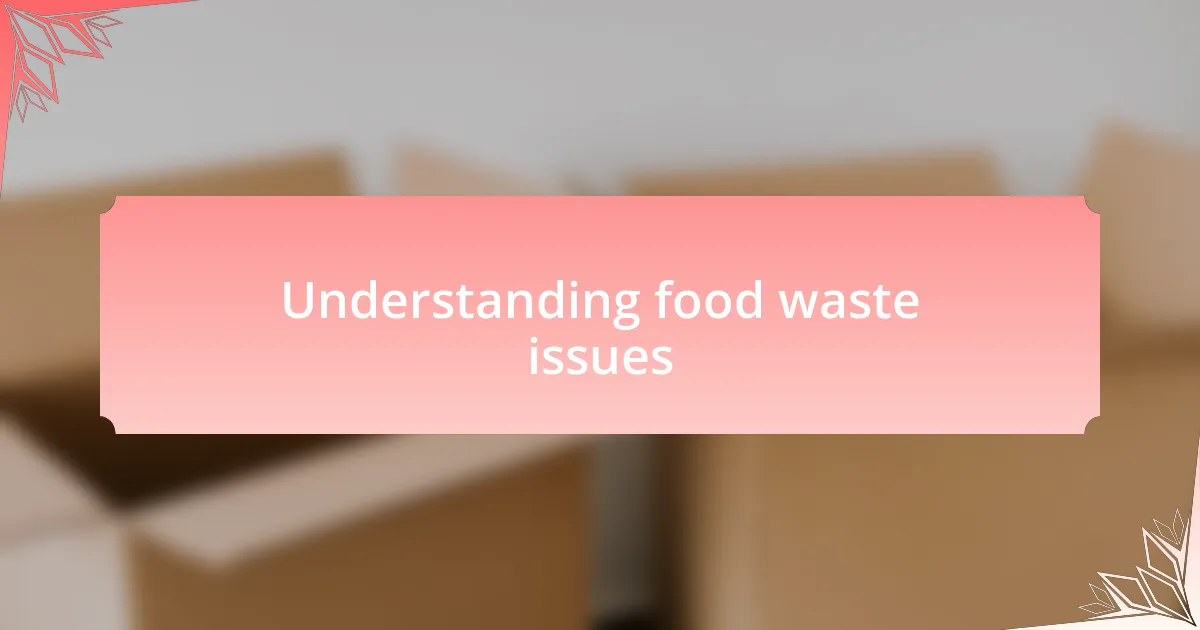
Understanding food waste issues
Food waste is more than just the scraps we toss in the trash; it’s a troubling reflection of our consumer habits and values. Once, I tossed out a whole bag of wilted greens, feeling frustrated as I recalled the time and money spent on purchasing them. Why do we often underestimate the impact of these small decisions?
Globally, approximately one-third of all food produced ends up in the landfill, contributing to significant environmental degradation. I remember reading about how this waste not only hinders food security but also generates methane as it decomposes—an incredibly potent greenhouse gas. It made me wonder, what if we all took a moment to consider the life cycle of our food before it reaches that dreaded garbage bin?
Understanding the nuances of food waste calls for a deeper emotional connection to our meals. Reflecting on shared family dinners, I can’t help but think about the value we place on food. Each meal is an opportunity not just to nourish ourselves but to connect, share, and respect the resources that brought that food to our table. How can we make choices that celebrate our food rather than allow it to go to waste?
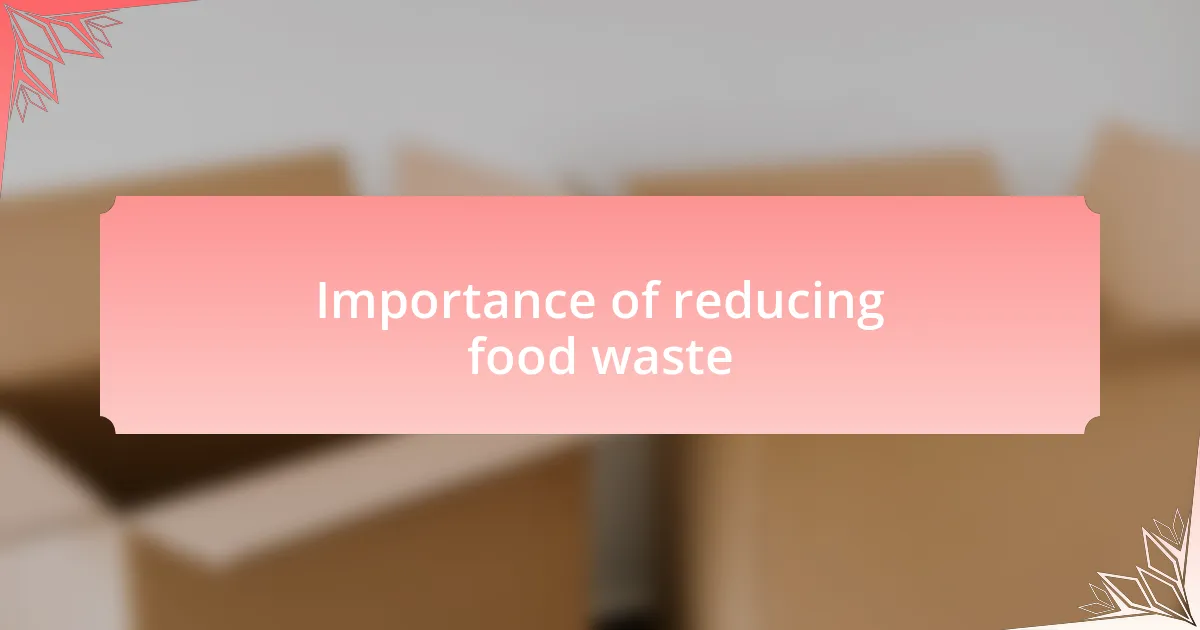
Importance of reducing food waste
Reducing food waste holds immense importance not just for our wallets, but for the planet. I often think about my own grocery trips, where I aimlessly toss items into my cart. Half the time, I can barely remember the meals I planned. Wouldn’t it be better if I made more mindful choices, ensuring that every item has a purpose?
When we cut down on food waste, we also lighten our ecological footprint. I recall a community event where we repurposed leftover meals into a delicious potluck, turning what would have been discarded into a feast. It was both uplifting and eye-opening to see how much potential lies in what we often overlook. What if every neighborhood implemented similar initiatives?
Furthermore, reducing food waste can foster a sense of community. I’ve shared recipes with neighbors to ensure we use up those extra ingredients languishing in our kitchens. It’s rewarding to see a simple act of sharing not only create joy but also reinforce bonds. Can small actions, like these, influence how we view food in our lives? I believe they can profoundly shape our relationship with nourishment.
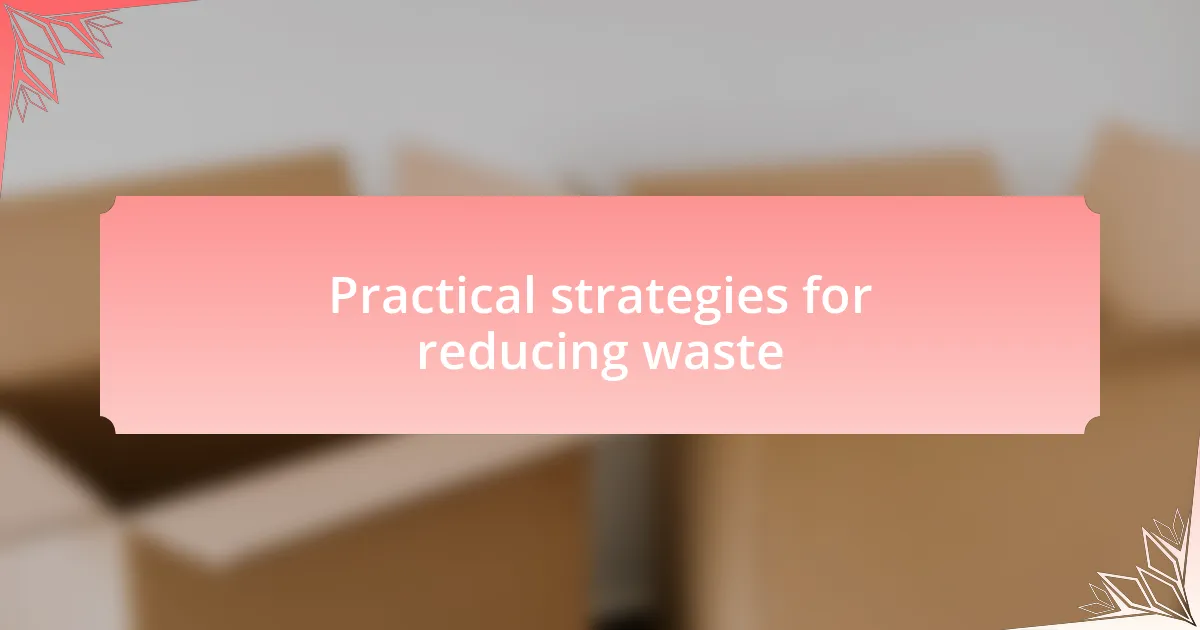
Practical strategies for reducing waste
One effective strategy I’ve found is to plan meals for the week. Whenever I sit down to map out the meals, I often realize that I can transform ingredients from one dish to another. For instance, using the leftover chicken from one night’s stir-fry in a soup the next day not only reduces waste but also saves me time and effort. Have you ever thought about how much easier meal prep could be if we just planned a bit ahead?
Another approach I’ve embraced is to shop with a list and stick to it. I can’t tell you how many times I’ve let spontaneity dictate my grocery choices, only to watch fresh produce wilt away in the fridge. By focusing on specific items I know I will use, I drastically cut down on impulse buys. Do you find yourself overbuying when there’s too much choice? Keeping a concise list has truly changed my spending habits and minimized waste.
Lastly, I’ve discovered the power of composting in my household. It’s eye-opening to see what I used to consider waste turn into nutrient-rich soil for my garden. When I started composting, it felt rewarding to transform scraps into something useful instead of just tossing them in the trash. Have you ever considered composting? It’s an empowering shift that connects you more deeply to the food cycle while reducing what goes to landfills.
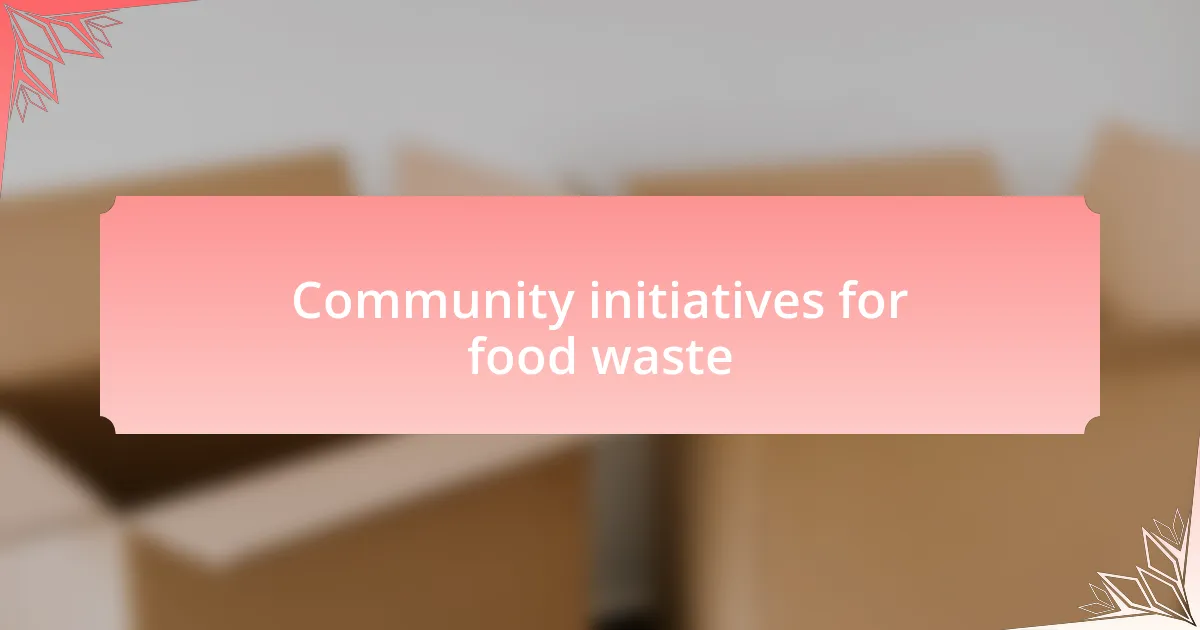
Community initiatives for food waste
Community initiatives play a crucial role in tackling food waste effectively. I’ve been impressed by local programs that organize community gardens where residents come together to grow fresh produce. Not only does this provide access to healthy food, but it also fosters connections among neighbors. Have you ever felt that sense of community when you share a garden harvest? It’s a remarkable way to minimize waste by utilizing land that might otherwise go unused.
Another inspiring example I witnessed was a food-sharing app implemented in my neighborhood. It allows individuals to post surplus food they have, making it available to others instead of letting it spoil. The first time I used it, I was thrilled to pick up extra loaves of artisan bread from a local baker. It struck me how simple technology could help build a support system for reducing waste. Have you thought about how many good meals could come from what’s left untouched in your pantry?
I also cherish the community meals organized by local advocacy groups, where residents can bring food that they might not use. I vividly recall participating in one of these potlucks; it was heartwarming to see dishes created from what would have become waste. Sharing meals like this not only reduces waste but also nurtures camaraderie. Isn’t it fantastic how sharing food can build relationships while keeping our community sustainable?
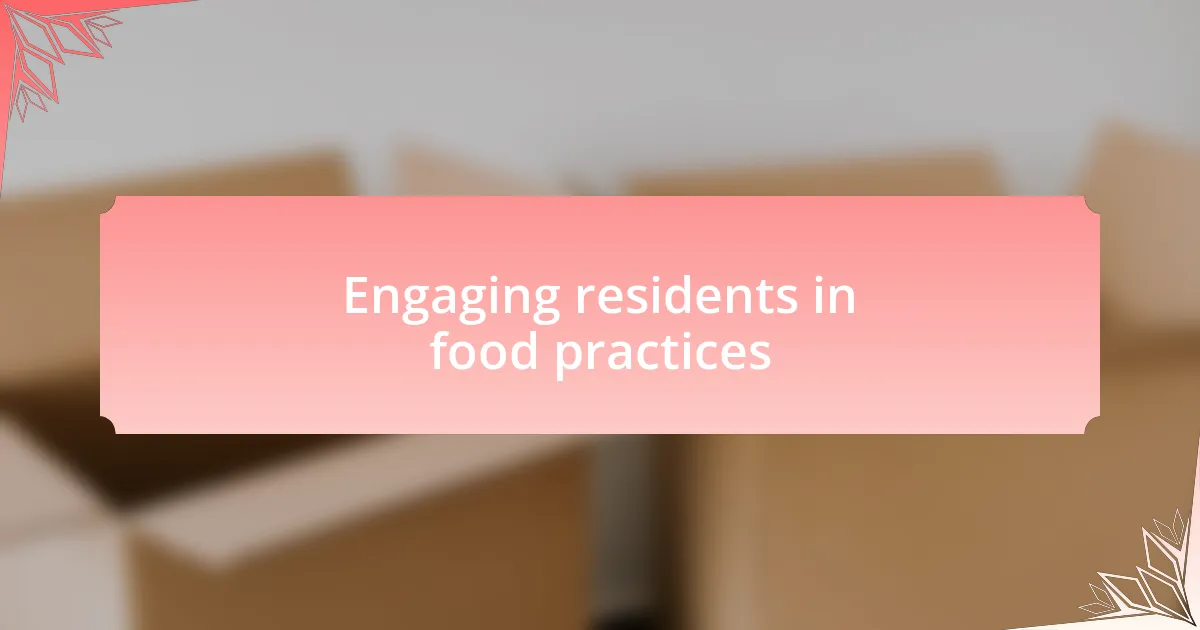
Engaging residents in food practices
When it comes to engaging residents in food practices, organizing workshops can be incredibly impactful. I recently attended a session on meal planning where attendees shared their strategies for maximizing ingredient use. The energy in the room was electric, and I noticed a surge of excitement as residents exchanged tips and tricks that effectively turned leftover ingredients into delicious new meals. Have you experienced the joy of discovering new possibilities in what you already have?
Another effective way to involve community members is through informal discussions about food management. I once participated in a focus group where we brainstormed ways to repurpose common food items. It was enlightening to hear how others creatively transformed what I thought were kitchen scraps into flavorful stocks or compost. Discussions like these not only broaden our perspectives, but they also inspire a sense of responsibility towards reducing food waste. Isn’t it intriguing how shared insights can lead to a collective commitment to sustainability?
Moreover, involving children in these practices can foster lifelong habits. At a local school, I witnessed children excitedly participate in a campaign to collect food waste for composting. Their eagerness was contagious, and it reminded me how early education shapes our views on food sustainability. Imagine the impact that could have if every child learned to value food from such a young age—how might that transform our communities in the long term?
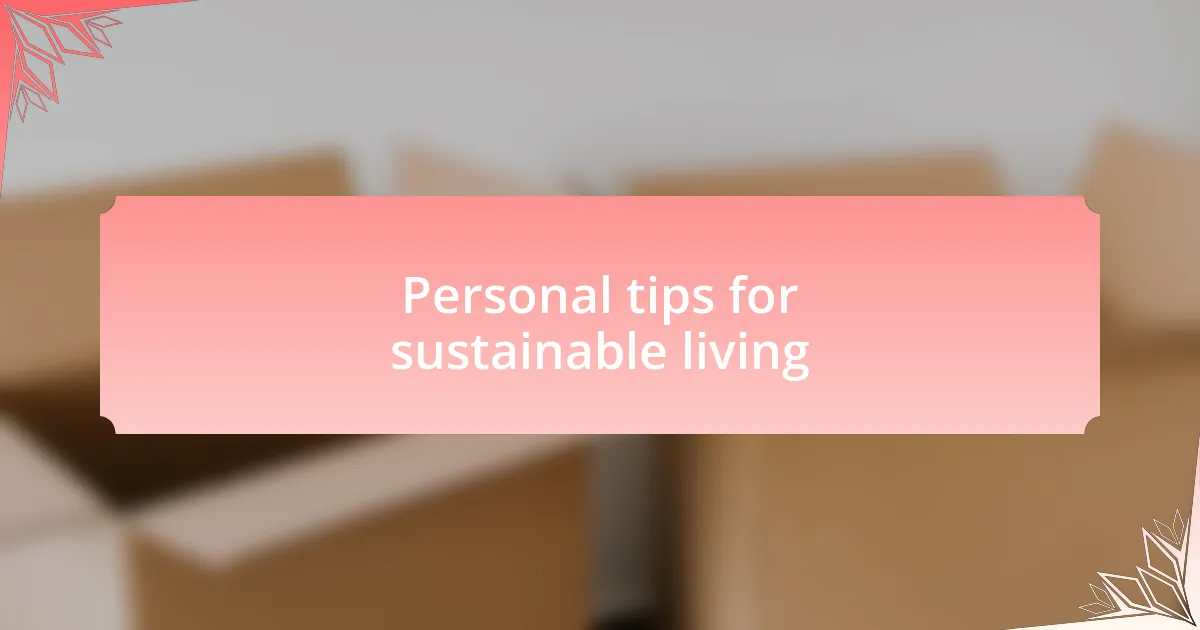
Personal tips for sustainable living
When I started focusing on sustainable living in my own home, I quickly learned the importance of buying in bulk. Not only did it reduce packaging waste, but it also helped me save money. I often ask myself, “What can I truly fit into my kitchen without letting it go to waste?” This mindset shift has made a noticeable difference in my food management.
Meal prep has become a game changer for me. I dedicate a couple of hours each week to cooking and portioning meals. This not only cuts down on spontaneous food spoilage but also makes it easier to resist the temptation of takeout. I found that when everything is ready to go, I’m much more likely to stay on track. Have you ever experienced the ease of reaching for a prepared meal instead of rummaging through the fridge?
Lastly, I’ve embraced the practice of “first in, first out” in my pantry and refrigerator. By placing newer items behind older ones, I find that I use up what I have before it spoils. This simple strategy has helped minimize waste significantly, and it sparks creativity in my cooking. I often wonder, “What delicious dish can I create with what’s on the brink of expiration?” Engaging with my food in this way not only reduces waste but makes every meal feel like an adventure.
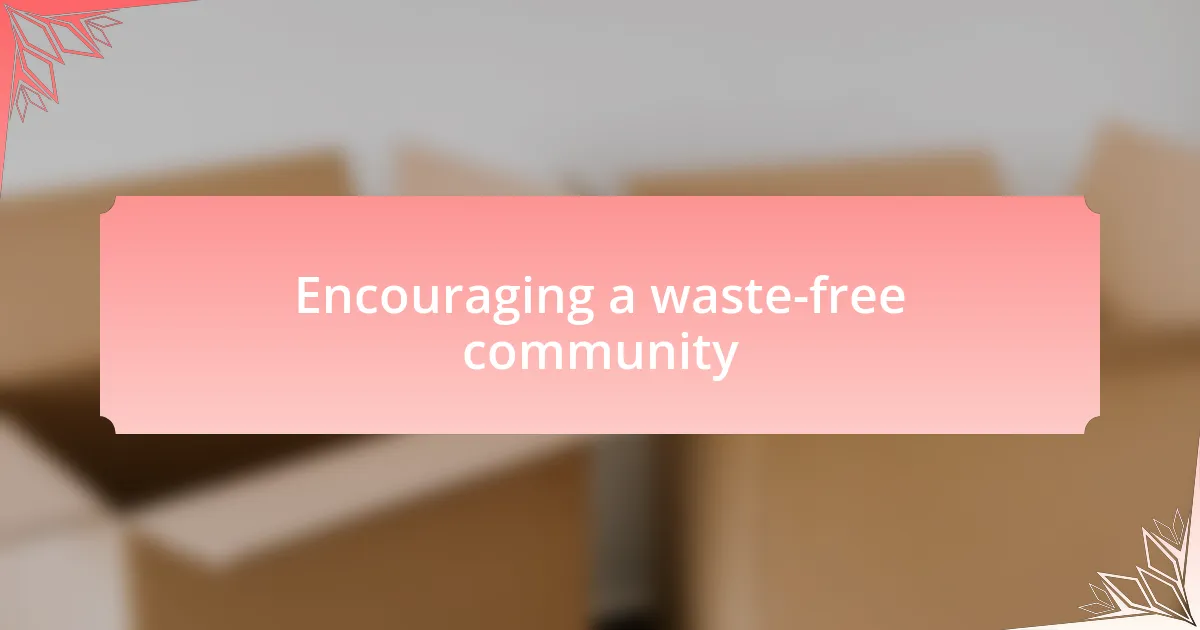
Encouraging a waste-free community
Creating a waste-free community truly starts with everyone’s commitment to mindful consumption. I remember when our local community organized a “food swap” event. It was a simple yet powerful way to foster connections while reducing excess. The excitement of trading homemade jams for fresh veggies not only reduced waste but also built relationships among neighbors, reminding me how food can bring us together.
In my experience, engaging local businesses in sustainability efforts can go a long way. When I approached a nearby café about implementing a discount for customers who brought their own containers, they were surprisingly receptive. It sparked a conversation about sustainability that spread through our community like wildfire, inspiring more residents to think twice about their choices. Can you imagine the difference even one small change can make?
Additionally, I find that hosting workshops on food preservation techniques creates a ripple effect of knowledge and action. Sharing my passion for canning and fermenting with others not only excites them but also empowers them to reduce waste in their kitchens. It’s amazing to see how much excitement builds around these practices as people realize they can turn potential waste into delightful treats. What new skills could you share that might inspire others to join the movement?